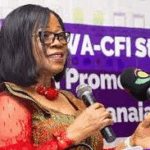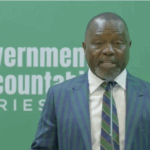
Despite Ghana’s strong track record in immunisation, vaccine hesitancy fuelled by misinformation, cultural beliefs, and mistrust continues to threaten public health gains.
To tackle this challenge, the National Vaccine Institute (NVI), in collaboration with the African Media and Malaria Research Network (AMMREN) and other health partners, has organised a national webinar aimed at strengthening vaccine communication and enhancing media capacity.
The initiative seeks to equip journalists with the knowledge and tools needed to effectively report on vaccines, counter misinformation, and promote public trust in immunisation campaigns.
Speaking on a webinar, Executive Secretary of AMMREN Dr. Charity Binka emphasised the crucial role of the media in sustaining vaccine confidence and national health security.
“Vaccines remain one of the most effective public health interventions in human history. Yet, their power can only be realised when people trust and accept them,” she said. “Misinformation and vaccine hesitancy continue to threaten progress, and that’s why strengthening communication and building media capacity are crucial.”
Dr. Binka highlighted recent instances of public resistance to the HPV vaccination campaign in Ghana as evidence of the urgent need for accurate and empathetic communication.
She described journalists as trusted voices who have the power to translate complex scientific data into relatable human stories.
“The media must be the champions of vaccine confidence seek out facts, challenge misinformation, and tell stories that move hearts and minds,” she urged.
Over the years, AMMREN has worked closely with the Ghana Health Service (GHS), World Health Organization (WHO) Ghana, and other partners to train journalists in vaccine reporting. These efforts have culminated in the creation of a National Vaccine Media Network, a platform for information sharing and collaboration among health journalists across the country.
Beyond communication, Dr. Binka stressed the importance of building Ghana’s own vaccine production capacity to reduce reliance on external supply chains—a vulnerability exposed during the COVID-19 pandemic.
“Local vaccine production is not just a health issue; it’s a matter of survival, sovereignty, and resilience,” she noted. “It will ensure timely access, create jobs, and position Ghana as a leader in health innovation in West Africa.”
The webinar forms part of a broader national effort by the NVI to deepen understanding of vaccines, promote informed public discourse, and empower journalists to report responsibly on vaccine-related issues.
As Ghana works to safeguard public health through vaccination, the call is clear—the media must stand at the forefront of building trust, fighting misinformation, and amplifying the life-saving power of vaccines.



